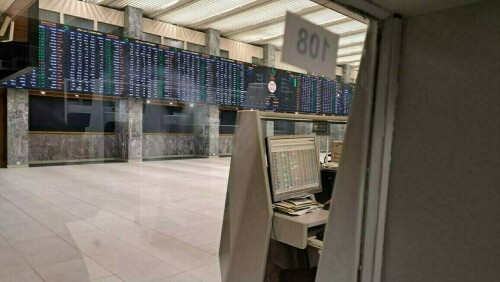PSX Plunges Amidst Selling Pressure
The Pakistan Stock Exchange (PSX) experienced substantial selling activity today, with the benchmark KSE-100 Index opening in negative territory and declining by over 2% during the day’s trading session.
As of 12:56pm, the KSE-100 Index was recorded at 112,482.00, reflecting a decrease of 2390.18 points, or 2.08%, compared to the closing figure of the previous day.
On Tuesday, the KSE-100 Index concluded trading at 114,872.18.
Escalating tensions between Pakistan and India, triggered by the Pahalgam incident, have exerted downward pressure on the stock market since the past week.
Information Minister Attaullah Tarar issued a warning early Wednesday regarding a potential military offensive by India against Pakistan within the upcoming 24 to 36 hours.
“Pakistan possesses reliable intelligence indicating India’s intention to launch a military strike in the next 24 to 36 hours, utilizing the Pahalgam incident as a fabricated justification,” the minister stated during a press briefing and in a post on X.
Globally, stock performance lacked clear direction on Wednesday, and crude oil prices declined as initial optimism about a possible de-escalation of global trade frictions was overshadowed by a deteriorating economic outlook and negative signals from corporations impacted by Donald Trump’s tariffs.
US Treasury yields also remained close to recent lows, as traders increased expectations of further interest rate reductions by the Federal Reserve to bolster the world’s leading economy.
Despite indications of Trump’s intention to mitigate the impact of auto tariffs and preliminary advancements in broader trade discussions, specific details remained vague, with Commerce Secretary Howard Lutnick mentioning that he had achieved an understanding with a foreign government.
In addition to tariff-related concerns, investors were also contending with worsening economic data from the US, as Trump’s significant tariffs had repercussions for domestic businesses and consumers.
“We are increasing the likelihood of a sustained economic slowdown over the next few months, potentially meeting the conditions for a recession, to 50%,” noted David Kohl, the chief economist at Julius Baer.
This information reflects an intra-day market update.



Comments (0)
No comments yet. Be the first to comment!
Leave a Comment